Greg Norman, Great White Shark, circles Trump
Before he featured in an embarrassing White House phone call, Greg Norman and Donald Trump had a falling out.
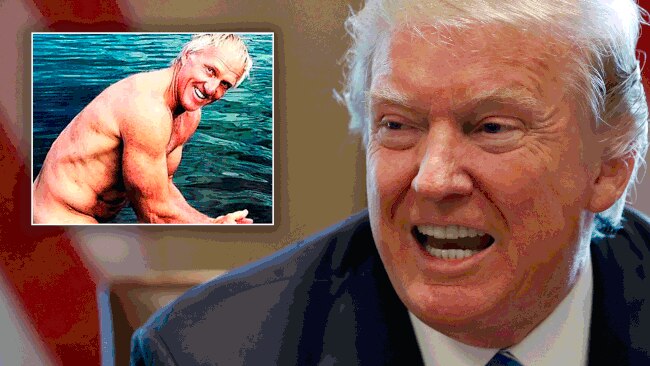
Remember that famously fractious telephone conversation between Turnbull and the new US President in January? By the end of it, when Trump had all but hung up on Turnbull, the leaders struggled to find common ground on anything much. Except Greg Norman.
Malcolm Turnbull: Good evening.
Donald Trump: Mr Prime Minister, how are you?
Turnbull: I am doing very well.
Trump: And I guess our friend Greg Norman, he is doing very well?
Turnbull: He is a great mutual friend, yes.
Trump: Well you say hello to him, he is a very good friend …
Seven months on, Norman sits on a chesterfield couch in the study of his Jupiter Island home in Florida and ponders Trump’s unusual decision to use him as an icebreaker on the front line of international diplomacy. “First of all I was disappointed that transcripts like that would be leaked out, I think it’s disgraceful how that can happen,” Norman says sternly of the leaked phone conversation. Then his face brightens. “But at the end of the day it does show the truth of how it happened. It validated me because a lot of people probably speculated, ‘Well, did he really do it, did he not do it?’”
The “it” that Norman is talking about is the one-man diplomatic campaign he conducted for Australia when he realised that his friend and sometime golfing partner was about to be the next US president. It began in the hours after Trump’s victory in November when Norman, at the request of Australia’s ambassador in Washington, Joe Hockey, gave Trump’s private mobile number to Turnbull so he could call to congratulate him.
But less well known is the fact that several weeks later, on November 26, Norman decided to reach out personally to Trump in the hope of better educating the billionaire developer about Australia. “I was at a dinner [function] with Donald at [his Florida club] Mar-a-Lago and I wanted to relay a message to him about the importance of the alliance between Australia and the US,” he says. “I thought it was very important for Donald to be aware of the relationship of ‘big brother, little brother’ that has evolved over decades. So I was at dinner with him and I actually went across to him and said, ‘This is an important message I want to get to you’. ” Trump, however, was distracted by others around him at the large function and Norman struggled to get the new president’s full attention. “I felt like it went right over his head and it disappointed me,” he says.
At that moment Norman spotted then White House chief of staff Reince Priebus walking across the room. “I just got up and intercepted him. I said, ‘Reince, this is important, you’ve got to get this message to Donald [about the alliance]’.” He believes Priebus did speak to Trump about the alliance and since then Norman says he has had a very “comfortable relationship” with the Trump White House. He can pick up the phone and get straight through to the most senior administration figures. “That’s how I started back-channelling the whole thing because to me I am a very proud Australian … and I wanted to put it in front of him so it is on his radar screen in the Oval Office.”
It might seem odd to many that a former golf player would seek to play a role in international diplomacy or that he would even get the opportunity. But ever since Norman burst into the spotlight in the early 1980s with his swashbuckling golf game and trademark white hair it was clear the so-called Great White Shark was motivated by more than golf. As a player in the ’80s and ’90s he held the sporting world in thrall with his do-or-die approach to the game that saw him hold the number one rating for an astonishing 331 weeks, second only to Tiger Woods. He amassed 91 international tournament wins including 20 PGA Tour tournaments and two British Opens, becoming the first golfer to surpass $US10 million in career earnings. Even while playing, Norman was building up a business empire that would dwarf the money he earned as the world’s best golf player. Along the way he struck up friendships with presidents, prime ministers and global CEOs. For Norman, life after golf has always shimmered far beyond the clubhouse.
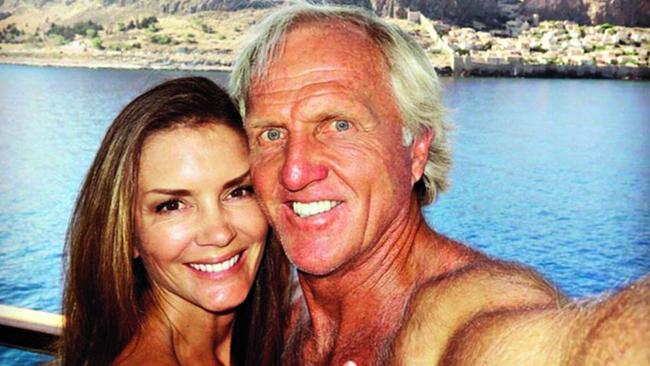
Now, at the age of 62, this grandfather of two should surely be winding down, reflecting on his golfing career, enjoying his Florida mansion and his Colorado ranch and travelling the world with his wife Kirsten (“Kiki”) in his private Gulfstream V jet emblazoned with his shark logo. But Norman is restless, hungry for the next challenge. “Disrupt or be disrupted,” he says, echoing a philosophy he has carried from his golf to his business career. He texts presidents, ex-presidents and prime ministers about world affairs, is diving into ambitious new business ventures and has even become a mature-aged poster boy for fitness after an Instagram shot of him bathing naked and flaunting a ripped body in Colorado went viral.
“He is tireless,” says Kirsten, 49, his wife of seven years. “He is up at 6am every morning making me coffee, says good morning to the kids and then gets straight to work. He sets a goal and never slacks off until it is done. I have not encountered many people with his tenacious work ethic.”
On the sweltering Florida summer morning of my visit, Norman has already texted Tshering Tobgay, prime minister of the remote Himalayan kingdom of Bhutan — who he met during a recent visit there — about a territorial dispute on Bhutan’s northern border.
Norman’s palatial house sits on a coastal waterway at the end of a long, palm-fringed driveway. I am greeted by a three-legged dog called Guinness and by Norman wearing a lavender polo shirt, blue shorts and thongs. The house is immaculate, decorated with Kirsten’s design flair in a beach theme and flanked by a huge swimming pool with diving board. Nearby are the tennis courts and gym. We walk past cabinets of silver golf trophies into his study, where his message machine constantly beeps in the background. From his study the view extends to the waterway and his boat Aussie rules, past his private putting green and two flagpoles, one bearing an Australian flag, the other the Stars and Stripes.
Despite being a resident of the US since 1981 and therefore speaking with a distinct US twang, Norman has never sought US citizenship. “I could have two passports but I only need one and that’s an Australian one,” he says. When Australia and the United States commemorated the 75th anniversary of the Battle of the Coral Sea at a gala dinner in New York in May, it was Norman who stood on stage in front of Trump and Turnbull to honour the Australian and US veterans.
“If I may say, because of my love of both countries for over four decades, ‘Little Brother’ Australia has gone above and beyond what ‘Big Brother’ America ever expected, continually strengthening an alliance, a bond forged by the common themes of freedom and democracy, for not just our people, but for the world,” he said as the President and the Prime Minister sat watching.
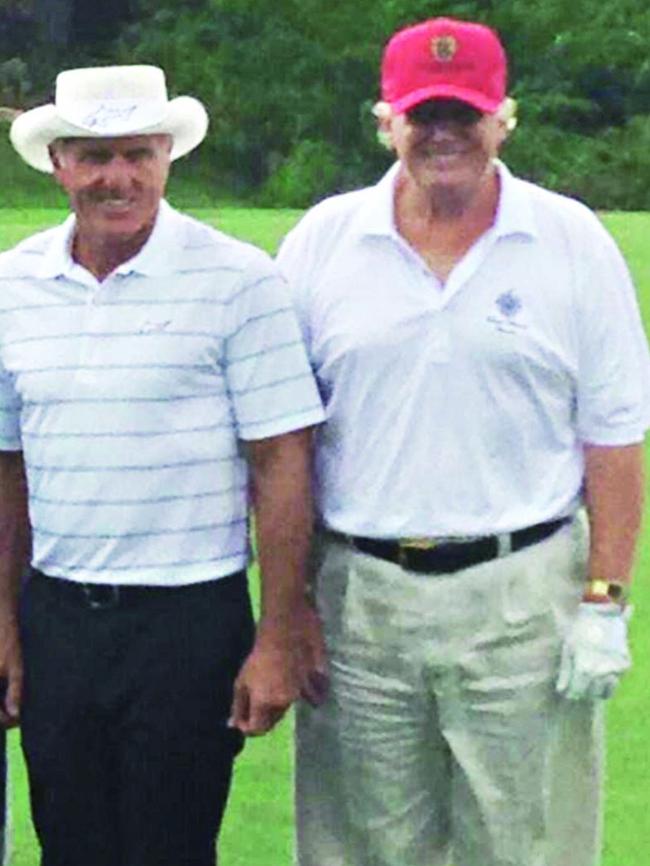
Norman describes himself as a Republican and an avowed conservative. Even before Trump’s election he was an unabashed fan of the billionaire and not only because he was a friend. He believed Trump would provide better conditions for businesses such as his own and a welcome disruption to America’s political status quo. “I’ve probably known him since the early 1990s playing golf with him, and then he bought a couple of golf courses I designed,” Norman says.
At the Coral Sea dinner, Trump referred to their friendship. “Thanks to the legendary talented golfer Greg Norman,” Trump said. “I used to think I was a great player and then I played with Greg one time and I said I’m not going to play again for a while.”
But their relationship has had its ups and downs. Norman was furious at Trump when, without telling him, Trump hired someone else to modify Norman-designed golf courses he had bought. “I was frustrated [by Trump],” he says. “To me it was a professional courtesy, I mean I would have liked it if he had called me up and said, ‘Greg you’ve done a fantastic job with it but I’ve got a business relationship with someone else’ and I would have been fine.”
Ten days before the November 8 presidential election, he called Trump to say he believed he would win. “I said to him, ‘Don’t change your strategy, stay true to yourself and you will stay true to your followers’,” he recalls. Shortly after Trump’s victory, Norman wrote: “Donald, for all his bluster, rhetoric and aggressive style of messaging, caught the attention of those that needed a rudder for their forgotten ship and beliefs. Like it or not he made a poignant and powerful impact on a base that sat sadly alienated.”
After Trump’s first turbulent 100 days, Norman was still an unabashed optimist. “I think he has adjusted very well going from the boardroom to the Oval Office … every day he becomes more presidential,” he said at the time. Now, more than seven months into his presidency and with Trump bouncing from controversy to controversy, Norman is a little more circumspect. “How is he going? I think he is his own worst enemy right now,” he says. “It is his personality. He is going to do what he wants and say what he wants but I think in the position he is in you have got to take a moment to reflect and not react. Think about what’s coming out of your mouth. Allow it to churn around in your brain a little bit more and then bring it out, because he is the leader of the free world.
“I have been fortunate enough to be around a few of them, very very statesmanlike guys like the Bushes and Clinton, and to see the difference in the way they conducted themselves as leaders [compared with Trump] it is like chalk and cheese. But he has the Stars and Stripes running through his blood, I mean it is thick for him. Populism will get you elected but you can’t run on that in the White House … He is getting in his own way and if he steps back a little bit and allows the process to evolve I think it will be a different story.”
From a business point of view, Norman says Trump is doing well. “Some of the policies he has put through are falling under the radar but I think he has done a good job with that and from a business perspective it’s all the stuff that I’ve been hoping for for the past eight years. [Under Barack Obama] we saw a dramatic change in the way we had to do business, whether it was healthcare or hiring people or growing the company, it has been very very painful for eight years because of the business regulations that are imposed on us.”
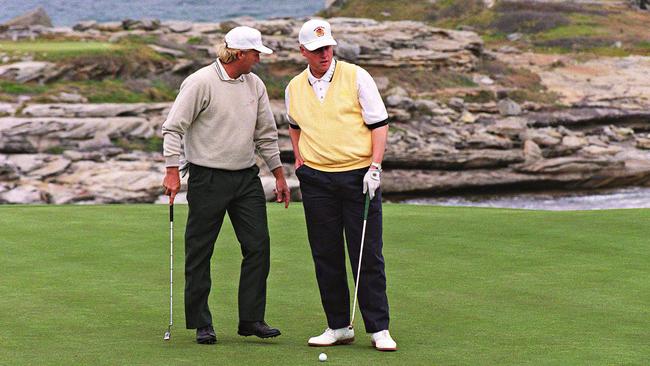
Norman also remains good friends with former president Bill Clinton, despite his friendship with Trump and the fact that Trump defeated Clinton’s wife Hillary. It was a friendship that almost never happened because Norman nearly rejected a request by the then president Clinton to play golf with him during a visit to Australia in 1996 on the grounds that Clinton was a Democrat. Norman sought advice from another presidential golfing buddy, former Republican president George H.W. Bush Sr, who said he should go along. The two men played and got on so well that they became solid friends. The following year Clinton famously tumbled down the stairs of Norman’s Florida home at 1.20am, ripping the tendons in his knee and putting the president on crutches for eight weeks.
In 2009, when Norman’s neighbour Tiger Woods — who has never said more than 20 words to Norman, despite living a kilometre down the road — was going through his messy breakup with his wife over his infidelities, Norman received a phone call from Clinton. “He called me up when I was in the backyard hitting balls,” recalls Norman. “He said, ‘Greg, go down there and talk to Tiger, you are the only one who can talk to him and tell him how he’s got to handle this.”
“I said, ‘Mr President, I can’t talk with him. I don’t know him’. ”
Says Norman: “I had the same friendship with Hawkie [former Labor prime minister Bob Hawke]. Just like Clinton, we were political opposites but our relationship was really good; you can have a free-flowing discussion and debate about what I see and what they see.”
He is also close with Lucy and Malcolm Turnbull, with whom he has shared several dinners. “He is a pretty savvy businessman,” says Norman. “We have shared ideas about how to help people and how to unlock value in certain things so we have had some fascinating conversations.”
Despite his stellar golfing career and business success, Norman has had a sometimes rocky relationship with the media and is protective of his reputation. He attracted tabloid headlines over his love life when in 2006 he had a bitter divorce from his wife of 25 years, Laura Andrassy, and wooed former American tennis star Chris Evert. His turbulent marriage to Evert ended in 2009 after only 17 months. Norman believes some of the reporting wrongly portrayed him as being a cad and says it has taught him not to judge others.
“I’ve got the philosophy that if you judge somebody on the opinions of others you don’t judge them, you judge yourself,” he says. “I made that big mistake with [Bill] Clinton and I’ve never done it again. There are always two sides to every story [so] don’t lay accusations and assumptions when you really don’t know the other side. I still find it very frustrating because I’ve lost a lot of friends because of the media reporting and they assumed I was that way and I wasn’t. And I go, ‘Hey, that’s your choice, I am going to meet a lot of other wonderful people in the world, I don’t need baggage.’ But that is what the media do, they can create a firestorm out of nothing that stays with you forever.”
Norman married Kirsten in 2010 in a private ceremony on Richard Branson’s Necker Island in the Caribbean. Kirsten, who is half German and half Filipino, has lived all over the world but grew up mostly in Sydney, where she attended Killara High School, model Elle Macpherson’s alma mater. A successful interior designer, she has two daughters, Kaya, 13, and Kelly, 10, from her first marriage to Zurich-based financier Neal Kutner.
“Greg and I have known each other since the early ’90s when my parents introduced us but between all our marriages/divorces and kids, we eventually lost touch,” she says. “He finally tracked me down in Switzerland through a mutual friend when his marriage to Chrissy was over. He sent me an email on my birthday, followed by a phone call and the rest is history. The timing was perfect.”
She says her life with Norman is a fast-moving blur of work and pleasure. “On any given day, when the kids are at school, I am managing staff, properties, renovations, working as lead designer on his real estate development projects, brainstorming new business ideas with him, meeting dignitaries or celebrities and attending functions and events all over the country,” she says. “Each day with Greg is different from the next.”
When they are not working or entertaining, Kirsten says they spend their time “at home alone, barefoot, with music on drinking chilled wine in the sweltering Florida heat. There is nothing better than relaxing with Greg, he is my absolute best friend. Physically, his energy is electric. When he turns his steely gaze on you it is almost unnerving. He is such an interesting man, who is curiously not egotistical or vain but instead he is fiercely protective, thoughtful, sensitive, devoted, affectionate and romantic.” His weakness? “His lack of patience and his unwillingness or inability to forgive.”
When home in Florida, Norman begins most days working in his office from early morning until around 2pm. He goes to his gym around 4pm to work out for up to two hours before relaxing with a glass of wine with his wife for an hour at 6.30 each night. Both of Norman’s adult children live down the road. His daughter Morgan, 35, runs his wine business, while his son Gregory Jr, 32, is a professional kite-surfer and a part-owner of a wakeboarding park with Norman.
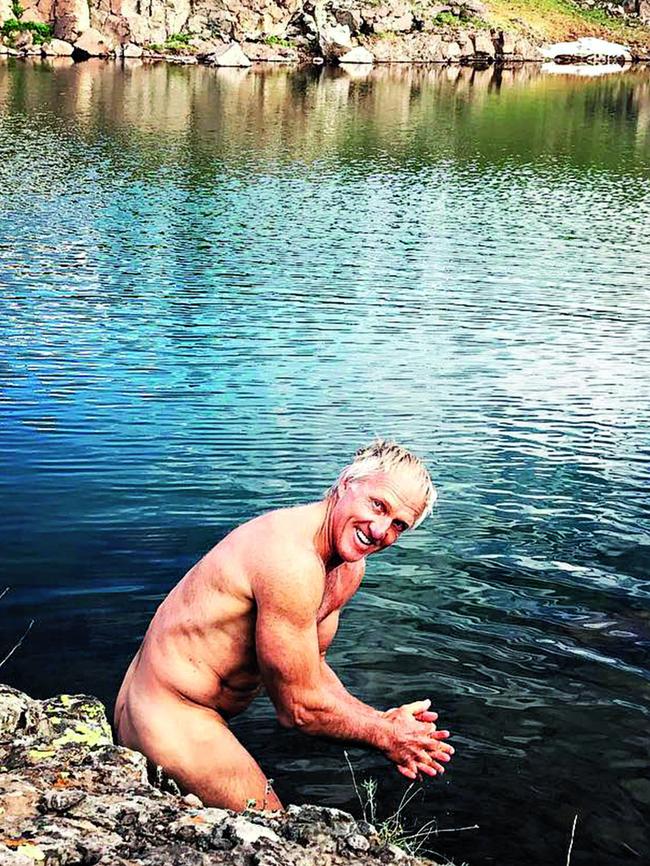
Whenever possible, Norman and Kirsten retreat to his $55 million Seven Lakes Ranch in Colorado, where at least once a year they ride horses into the wilderness for three or four nights’ camping under the stars. Their last ride achieved unexpected global notoriety when Norman jumped off his horse and took a naked bath in a mountain lake, looking more like a senior member of the Chippendales male revue than a grandfather. “It was quite warm up there so I just jumped in and my wife said ‘you look hot’ and she took a photograph and said, ‘Why don’t you Instagram this?’
“I thought, ‘Oh shit’, but I didn’t think [it would go viral]. I love my Instagram account because it is me. Some people think I am showboating but I am not, that is me,” he says.
Their visit to the ranch last month was especially poignant for Norman because his whole family — Morgan and Gregory Jr, his mother Toini, sister Janis and two grandchildren Harrison, three, and Hendrix, one — came together to celebrate his father Mervyn’s 90th birthday. Norman says he opened up for the first time to his father about his business empire and his plans for the Norman name to continue long after his death. “The most powerful moments for my father and me was that we disappeared off and talked,” he says. “He wanted to know all about my business. It was really cathartic for me because I don’t open up to anyone, I don’t talk about the details of what is happening.”
While most successful golfers manage to make a living from their name for a while after they retire, Norman morphed early into a fully fledged entrepreneur. At the age of 32, when he had more than 20 years of playing ahead of him, he started designing and building golf courses. In 1993, still at the height of his playing career, he took what he calls “the biggest shot I ever made in my life” by leaving the security of the sports management company IMG to create his own company, Great White Shark Enterprises.
“I had no education about how to do it; I had no guidance of that. I believed in myself and it just evolved.” And evolve it did. He has since developed his own wine company, Greg Norman Estates, an apparel company focusing on golf-inspired sportswear, an interior design group, a real estate development company, an eyewear company, a premium brand of Australian Wagyu beef, a debt lending company for small business, an Australian-style barbecue grill restaurant in South Carolina, a wakeboarding park and a golf academy. He has designed and built 102 golf courses around the world with a further 14 under construction and 34 under contract. Norman won’t reveal financial details of his company except to say his business is “very comfortable”, but in 2012 US Golf Digest magazine estimated he was worth $235 million.
Despite his success, Norman got a shock several years ago when focus groups of millennials told him that while they liked the company’s shark logo and name, they didn’t link it to Greg Norman. “They were like, ‘Who are you?’ ” he says. “Our logo was old and stale and our position was in with the baby-boomers,” he says. “So I said we need to give ourselves a 200-year horizon to grow the legacy of the brand into perpetuity post my death.” In October last year, Norman rebranded his business enterprise with a new, sleeker-looking shark logo, calling it simply the Greg Norman Company.
Norman says that when he told the full story of his business empire to his father in Colorado for the first time, it was a moment to cherish. “So for my dad to sit there [and hear all this], I mean you could just see him welling up with pride.”
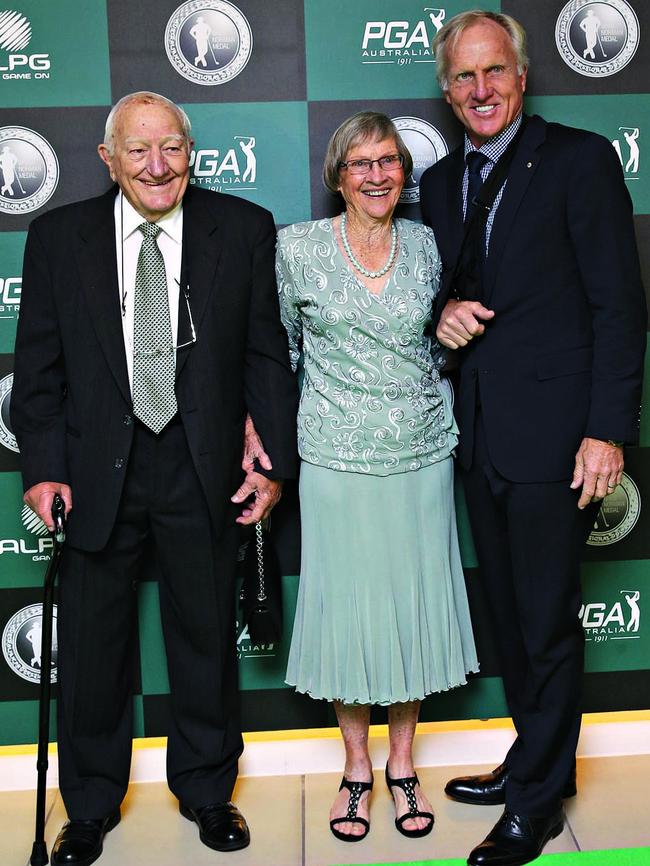
Norman still feels deeply grateful for the idyllicchildhood his parents blessed him with. Born in Mt Isa, he grew up in Townsville from the age of three months and spent his days diving, fishing and riding horses along the beach. After Mervyn, an electrical engineer, moved the family to Brisbane when Norman was 14, his mother asked him to caddie for her while she played golf. It was an inspired move. Barely 18 months later he was a scratch golfer, and at the age of 21 he turned professional.
Although Norman last played a tournament in 2012 at the age of 57, he has never officially retired. “I never wanted to be a ceremonial golfer and I never wanted to have a retirement and say, ‘This is my last season’,” he says. “Everybody wanted me to do that but I said, ‘No, I’m just going to ride off into the distance’.” He is sceptical he will ever return to the game at the top level because of his business commitments and the fact that he hates to practise. But he says his body is fit enough if he changes his mind. “If I started today and gave myself six months of getting honed and sharpened up, I bet you I could compete.”
Even if he doesn’t play again at the highest level, Norman says he is proud of his career. “Look, I probably exceeded my expectations when I was an assistant pro at the Royal Queensland Golf Club making $28 a week,” he laughs. “I always wanted to be the best that I could be but I never had any concept that it would take me to number one in the world. So when I look back on it, you can look at it in two ways. I can be extremely disappointed because I could have won a lot more majors than I did, but at the same time I never expected to do as well as I did, so I am very pragmatic about it.”
He remains sensitive about the “choker” tag that some gave him after he squandered big leads for a tragic run of second-place finishes. In 1986, he led all four golf majors into the final round but won only one of them. “The word choker is a media word,” says Norman, who still gets animated by the topic. “If I sound defensive or protective, all I can say is that every individual in this world has been confronted with a situation where they made a mistake. Is that a choke? No, it’s not a choke because there are outside agencies that create that situation. So it’s very easy to throw this shit against the wall and say he choked … it’s going to stay forever no matter what I say. [But] when people look back on it and reflect on their lives, I bet there are times when they say, ‘Oops’.”
Overall, Norman looks back fondly on the game and the life it gave him. “Because of my personality I embraced the moments, I wore my heart on my sleeve a lot of times, I met wonderful people from leaders of the free world to prime ministers to CEOs. It wasn’t the golfers but the people outside of golf who really helped me to get where I am today.”
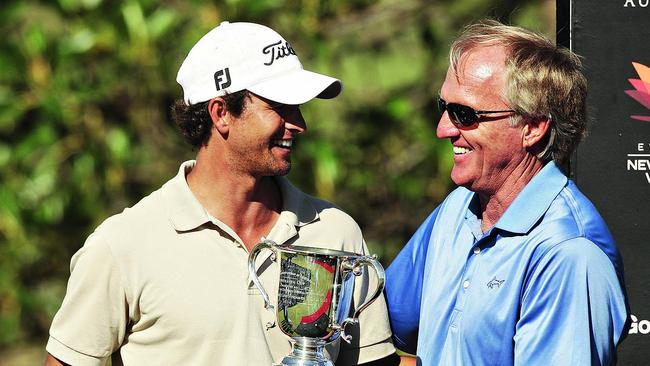
He still takes a keen interest in the game and is a mentor to Australia’s current crop of stars including Adam Scott and Jason Day. He watched “with tears in my eyes” as Scott won the 2013 US Masters, the tournament whose trophy eluded Norman. Straight after his win, the then 32-year-old Scott said of Norman: “He inspired a nation of golfers, anyone near to my age, older and younger, he was the best player in the world and he was an icon in Australia … Part of this is for him because he has given me so much time and inspiration and belief.”
“It meant a lot to me,” says Norman, who was deeply moved by Scott’s impromptu tribute in front of the golfing world. “To be a mentor to some degree is the most rewarding thing in the world.”
Now, happily married and with his businesses growing, he is pondering the biggest upheaval of all: a possible return to Australia after almost 40 years in the US. “I would love to go back and have a place there, actually,” he says. “I would love to have a vineyard. I don’t know where; I love Margaret River, I love the Barossa Valley, the Yarra Valley, the Hunter Valley.” Kirsten is even keener to return to Australia. “I love Australia,” she says. “Australians are very hip and trendy and the culture is much more interesting than Florida. I am a very chilled beach girl at heart so I hope one day to move back with Greg to build our dream home somewhere in Queensland.”
Norman admits he is flirting with the idea more often. “I occasionally go on realestate.com.au on a rainy Sunday morning with a cup of coffee and surf the Australian real estate market for a couple of hours.” But this restless old golfer, entrepreneur and self-styled diplomat is unlikely to move home just yet. For now, he is too busy scanning the horizon for new opportunities in Trump’s America.

